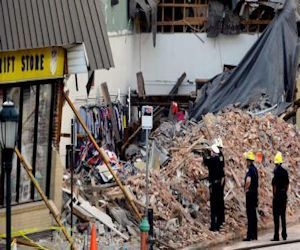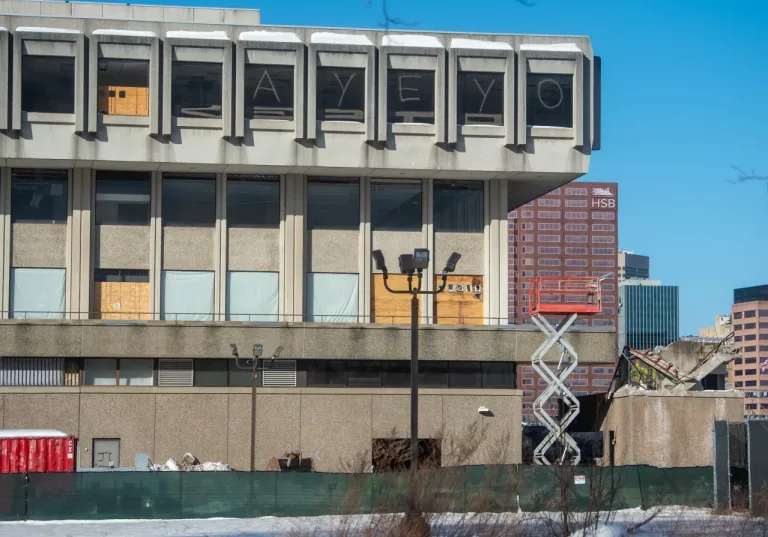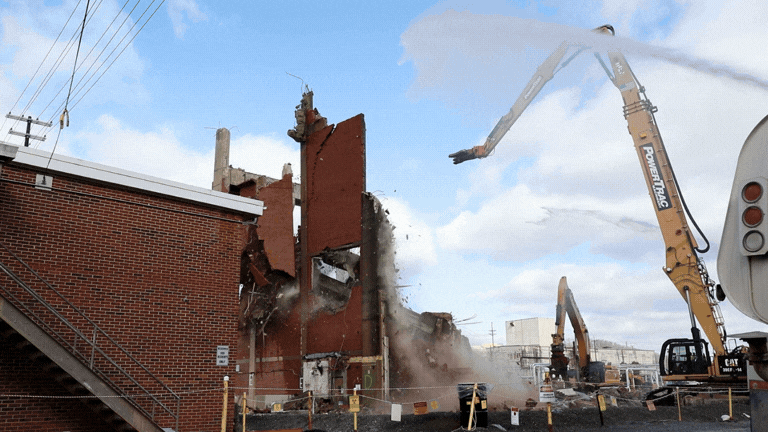
<font color="black">AP Photo/Matt Rourke</font>
A bond requirement before a building is demolished?
In Hastings, yes; in Grand Island, current system is fine
To make sure demolition and moving projects get done correctly, some cities require contractors to post a bond beforehand.If the work doesn’t get done, the city uses that money to finish the job. That money can also be used to repair streets or any other damage incurred during the project.Hastings is one city that requires demolition bonds. Grand Island does not.
Grand Island Building Department Director Craig Lewis is satisfied with the current system, in which a judge gives the city approval to finish the job and costs are assessed to the property owner.Demolition contractor Pat O’Neill thinks that having a $10,000 bond for demolition and house moving projects would be beneficial “because it would make sure that projects got done quickly and correctly, and any damages to streets or utilities would be repaired.” Grand Island has “a pretty good system” as it is, O’Neill said, but he doesn’t think it would hurt to require a bond in some cases. “You kind of weed out some of the bad actors” when “they’ve got to come up with that bond, ” he said.
A Hastings representative told O’Neill the bond system “just makes it easier for them to get compliance out of their contractors. ”Sometimes, O’Neill said, it would be easier for a city to just say “we’ll take your $10,000 bond and finish it up and give you what’s left.”
Such guarantees are sometimes called completion bonds or surety bonds.
Conoco Motel
The subject came up last week during interviews about the old building in front of the Conoco Motel on West Second Street. Owners of that building promise the work will get done, but right now it’s widely regarded as an eyesore.
From a contractor’s standpoint, the costs of getting a bond are minimal when you work with an insurance company, O’Neill said. “Basically it’s a guarantee that if you don’t complete the project that the bonding company will pay to have it completed,” said O’Neill, who owns O’Neill Transportation and Equipment.
The city of Hastings has a bond requirement for demolition. For moving buildings, “we have a bond or insurance requirement,” said Building Inspector Mark Evans.The system “mostly” works well, Evans said. For small demolition projects, such as a garage, the bond requirement is $500. “A lot of people just put up cash or a cashier’s check,” Evans said.“We got burned once,” he said. The contractor picked up the $500, which the homeowner had paid. Now the city requires the person to “sign for it when they give it to us” and “we just release it to the same person,” Evans said.
Cities need to have a good chain of custody if cash is involved, he said.
Six-month time limit
The time limit in Hastings for demolition and moving is six months, although moving isn’t usually a problem because people are in a hurry.Hastings doesn’t strictly enforce the six-month limit. If a homeowner needs a little longer to demolish a building, the city will give him an extension.The city of Hastings tried once to collect on a demolition deposit, but the check bounced. “We used to take a personal check,” Evans said. “So that’s why we went to cash or cashier’s check.”
Insurance agents can help with the bond requirement. The property owner just needs to “scrape together $500, because you’re going to get it back,” Evans said.The money is released once the demolition is done and the site is cleaned up. The idea is that if the permit holder “didn’t finish the job, we would have some funds to go against,” Evans said. There has been only one instance where the city tried it. In that case, because of the bounced check, the city wound up doing the demolition and assessing the property. Either way, there are mechanisms to recover the money, Evans said. “It’s nice to have the money up front, as opposed to going after it through the courts,” he said. Lewis isn’t convinced the system would work as smoothly as advertised.
“It sounds really good but I’m not sure that they work as well as they’re intended,” he said. In an agreement between private parties, a property owner can require a contractor to provide a bond, Lewis said.
Court permission
Under the current system in Grand Island, the city receives court permission to take care of a problem.
When there is a nuisance project, the city will give the property owner a certain number of days to abate the nuisance. If nothing is done, the city asks a judge for permission to go on the property and take care of it.
A contractor is then hired to demolish the building. The cost of demolition is assessed to the property owner. “And hopefully at some point in time we can get our money back,” Lewis said. If a completion or surety bond were required, Lewis believes the process would be about the same.
In Geneva, when somebody moves or tears down a house, the city has the contractor provide insurance information, a bond or a cash deposit. In smaller towns, when you know the people doing the work, it’s easier to hold them accountable, said Geneva City Administrator Kyle Svec. The city, he said, has to make sure repair work is done if contractors “tear up our streets,” Svec said. A city has an obligation, he said, to protect its streets and property and to a project’s neighbors.
By Jeff Bahr
je*******@************nt.com







